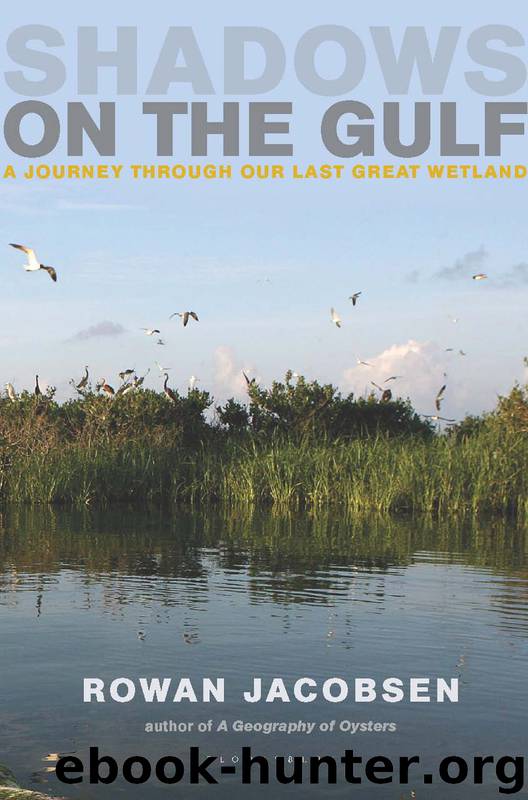Shadows on the Gulf by Rowan Jacobsen

Author:Rowan Jacobsen
Language: eng
Format: epub
Publisher: Bloomsbury USA
Published: 2011-04-08T04:00:00+00:00
Chapter 9
TEN THOUSAND CUTS
TO ME, THE most chilling article published during the summer of 2010 was not about oil-eating bacteria, petroleum-smeared pelicans, or exploding rigs. It was not about BP at all. It was not even about Louisiana’s crumbling marshes. To me, the piece that made me sit back from my laptop and shiver was an unassuming little snippet published in the July 29 issue of Nature titled “Global Phytoplankton Decline over the Past Century.” In the article, a team from Canada’s Dalhousie University shows that the planet’s phytoplankton populations have been declining about 1 percent per year, leading to a 40 percent reduction in phytoplankton since 1950.
That should have caused massive riots all over the world, and emergency summits of global leaders, because if phytoplankton continue to decline at that pace, we can all just pack it in. Phytoplankton feed almost all the fish on Earth. They produce half the oxygen and sequester as much carbon dioxide as all the forests on the planet. If phytoplankton are truly declining, then the oceans are dying, and the rest of us are, too. We cannot survive without the seas.
I bring this up not because I have any solutions, and not because I want to ruin your day, but simply because I want to put the BP spill in perspective and point out an irony. After the accident, people who never gave a damn about the Redneck Riviera became suddenly tearful with concern for the Gulf’s wildlife and human communities. They were also convinced that 205 million gallons of oil, plus a couple of million gallons of dispersant, would kill off all the life in the Gulf in a black cloud of toxic waste. But the truth is that we have been screwing the Gulf for decades.
“Same ole same ole,” Diane Wilson, a fourth-generation Texas shrimper turned environmental activist, wrote on Grist. “I hate to say it, but what I’m seeing now in the Gulf ain’t nothing new. The toxic releases, the lies, the cover-ups, the skimping on safety, the nonexistent documents, the ‘swinging door’ with regulators, the deaths … This is the biggest flame among the thousands of fires set by Corporate America on its Sherman-like march across the Gulf.”
Some of those flames are literal. One of the most enduring images of the BP fiasco is the gigantic pilot light atop the drill ship Discover Enterprise as it siphoned petroleum from the blown-out well. That petroleum was a mix of oil and natural gas. The liquid oil can be captured, but the lighter natural gas can’t. It had to be flared off to prevent any risk of explosion. (It was natural gas that blew up the Deepwater Horizon in the first place.)
Crude is always a mix of oils and natural gases. Ideally, the gases are captured and sent through pipelines to refineries. Sometimes they can be reinjected into the ground. But often, the technology isn’t in place, and the only safe way to deal with the gas is to flare it.
“Safe” being a relative term.
Download
This site does not store any files on its server. We only index and link to content provided by other sites. Please contact the content providers to delete copyright contents if any and email us, we'll remove relevant links or contents immediately.
The Lonely City by Olivia Laing(4118)
Animal Frequency by Melissa Alvarez(3752)
All Creatures Great and Small by James Herriot(3512)
Walking by Henry David Thoreau(3233)
Exit West by Mohsin Hamid(3181)
Origin Story: A Big History of Everything by David Christian(3137)
COSMOS by Carl Sagan(2949)
How to Read Water: Clues and Patterns from Puddles to the Sea (Natural Navigation) by Tristan Gooley(2851)
Hedgerow by John Wright(2775)
The Inner Life of Animals by Peter Wohlleben(2765)
Origin Story by David Christian(2682)
How to Read Nature by Tristan Gooley(2662)
Project Animal Farm: An Accidental Journey into the Secret World of Farming and the Truth About Our Food by Sonia Faruqi(2658)
How to Do Nothing by Jenny Odell(2643)
A Forest Journey by John Perlin(2585)
Water by Ian Miller(2580)
The Plant Messiah by Carlos Magdalena(2453)
A Wilder Time by William E. Glassley(2362)
Forests: A Very Short Introduction by Jaboury Ghazoul(2335)
